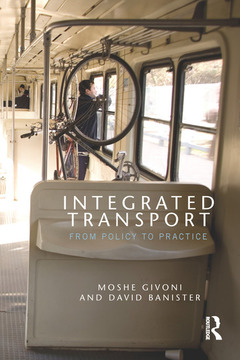Integrated Transport From Policy to Practice

Travel is an essential part of everyday life and today most journeys are multimodal. It is the total travel experience that counts and integrated transport must reduce the inconvenience of transfers between modes. Most research and many publications on transport policy advocate sustainable transport, but the priority given to integration has been negligible. Yet integration is one of the most important means to advance sustainable transport and sustainability more generally.
While integrated transport systems are seen to be an ideal, there is a failure to make the transition from policy to practice. The authors argue that the achievement of sustainable transport is still a dream, as an integrated transport policy is a prerequisite for a sustainable transport system. It is only when the two concepts of sustainability and integration operate in the same direction and in a positive way that real progress can be made.
In this book, transportation experts from across the world have addressed the questions about what is integration, why is it so important and why is it so hard to achieve? The book provides an in-depth analysis of these issues and it aims to provide a better understanding of the subject, about what should be strived for, about what is realistic to expect, and about how to move forward towards a more integrated provision of transport infrastructure, services and management.
1. The Need for Integration in Transport Policy and Practice Section 1: The Main Issues in Integrated Transport 2. Integrated Transport Policy: A Conceptual Analysis 3. Planning For a Sustainable Travel: Integrating Spatial Planning and Transport 4. The Need for Integrated Institutions and Organisations in Transport Policy – the Case of Transport and Climate Change 5. Integrated-Transport Policy in Freight Transport 6.The Value of Reliability and its Relevance in Transport Networks7. Appraisal of Integrated Transport Policies Section 2: Application of Integrated Transport Policy 8. Integrating Individual Travel Desires in Transport Planning: What is Too Far and What is Too Close? 9. Planning Walking Networks and Cycling Networks 10. The Role of ICT in Achieving Integrated-Transport Networks 11. Developing the Rail Network through Better Access to Railway Stations – the Need for IntegrationSection 3: Assessing the Potential Benefits of Integrated Transport Polices 12. Measuring the Costs and Benefits of Integrated Transport Policies and Schemes13. A Decision Analysis Framework for Intermodal Transport: Evaluating Different Policy Measures to Stimulate the Market14. Integrating the Railways – Key Assessment Issues 15. Assessing Iintermodal Re-Balance and Integration in Urban Transportation Planning: An Illustration on the Basis of a Sub-Lagoon Tube Plan for Venice16. The Effects of Weather and Individual Characteristics on the Speed of Public Transport Trips: An Empirical StudySection 4: The Challenges in Achieving Integrated Transport at National, Regional and City Levels 17. Impediments to Integrative Transport Policies: Lessons from the Case of Modiin 18. Integrating Public Transport Management in France: How to Manage Gaps Between Mono-Scale Policies19. Intermodalism in the U.S.: Issues and Prospects20. The Pursuit of Integration: How Far and What Next?
Moshe Givoni is a Senior Researcher at the Transport Studies Unit (TSU) which is part of the School of Geography and the Environment (SoGE) at Oxford University. He is also a Research Fellow at Wolfson College. Before joining Oxford he was a Marie Curie Fellow at the Department of Spatial Economics, Free University Amsterdam. He gained his PhD at the Bartlett School of Planning, University College London and his academic background also includes degrees in Economics and Geography (BA) and Business Administration (MBA) from Tel-Aviv University.
David Banister is Professor of Transport Studies at the University of Oxford and Director of the Transport Studies Unit. He is also currently Director of the Environmental Change Institute in the School of Geography and the Environment at the University of Oxford. Until 2006, he was Professor of Transport Planning at University College London.
Date de parution : 11-2015
15.6x23.4 cm
Disponible chez l'éditeur (délai d'approvisionnement : 14 jours).
Prix indicatif 53,83 €
Ajouter au panierDate de parution : 06-2010
15.6x23.4 cm
Disponible chez l'éditeur (délai d'approvisionnement : 14 jours).
Prix indicatif 184,47 €
Ajouter au panierThèmes d’Integrated Transport :
Mots-clés :
Integrated Transport Policies; public; Fi Ve; policy; Transport Integration; freight; CBA; benefi; Freight Transport; network; Sheffi Eld; rail; UK Source; travel; In-vehicle Time; time; Integrated Ticketing; cycling; Rail Trips; systems; Transport Policy; Policy Integration; Public Transport Integration; Travel Demand Management Measures; Total Travel Time; Integrated Transport System; Rail Stations; Rail Transport; Transfer Penalties; Intermodal Terminals; Promote Policy Integration; Intermodal Transport; Commuting Trips; Ho Ld; Inland Waterway Transport


